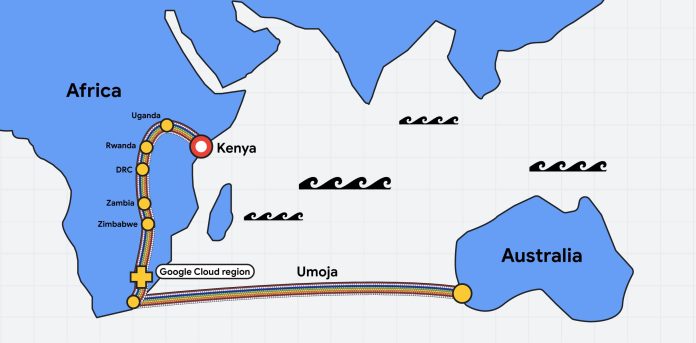Google is set to construct the first subsea fiber optic cable linking the continents of Africa and Australia, in a move aimed at enhancing global connectivity. This announcement comes amid intense competition among major cloud providers, with Google striving to catch up with Amazon Web Services (AWS) and Microsoft Azure.

The new cable, named “Umoja,” will begin in Kenya and traverse several African countries, including the Democratic Republic of the Congo, Rwanda, Uganda, Zambia, and Zimbabwe, before reaching South Africa. South Africa is also home to Google’s first African data center region, which has been operational in Johannesburg since early this year.
Google’s announcement follows a series of outages across Africa caused by faulty undersea cables. By establishing a new, resilient route, Google aims to position itself as a key player in providing reliable connectivity solutions. “Umoja will enable African countries to more reliably connect with each other and the rest of the world,” Brian Quigley, Google Cloud’s VP for Global Network Infrastructure, stated in a blog post.
The terrestrial portion of Umoja’s route, already completed in partnership with Liquid Intelligent Technologies, runs through various African countries. The next phase involves channeling the cable across the Indian Ocean to Perth, Australia, though no timeline for completion has been confirmed.
Google’s efforts are part of a broader trend among tech giants to invest in global connectivity infrastructure. More cables and data centers mean better service quality, including lower-latency YouTube streams and faster data transfers for enterprises relying on cloud computing. Currently, the closest subsea cable route to Umoja is the Oman Australia Cable (OAC) by SUB.CO, operational since 2022.
In addition to Umoja, Google has invested in other African cabling projects, such as Equiano, connecting Portugal with Nigeria and South Africa. The company also recently announced plans for a subsea cable connecting South America with the Asia-Pacific region, from Chile to Australia via French Polynesia.
While no specific completion date for Umoja has been provided, Google estimates that a typical submarine cable project, from planning to operational status, takes around three years. Therefore, the Umoja cable could potentially be ready by 2026.
Source: Guru8
